Dress To Protest: Watermelon Edition
Provocative but safer than a flag - the fruit defining the protests
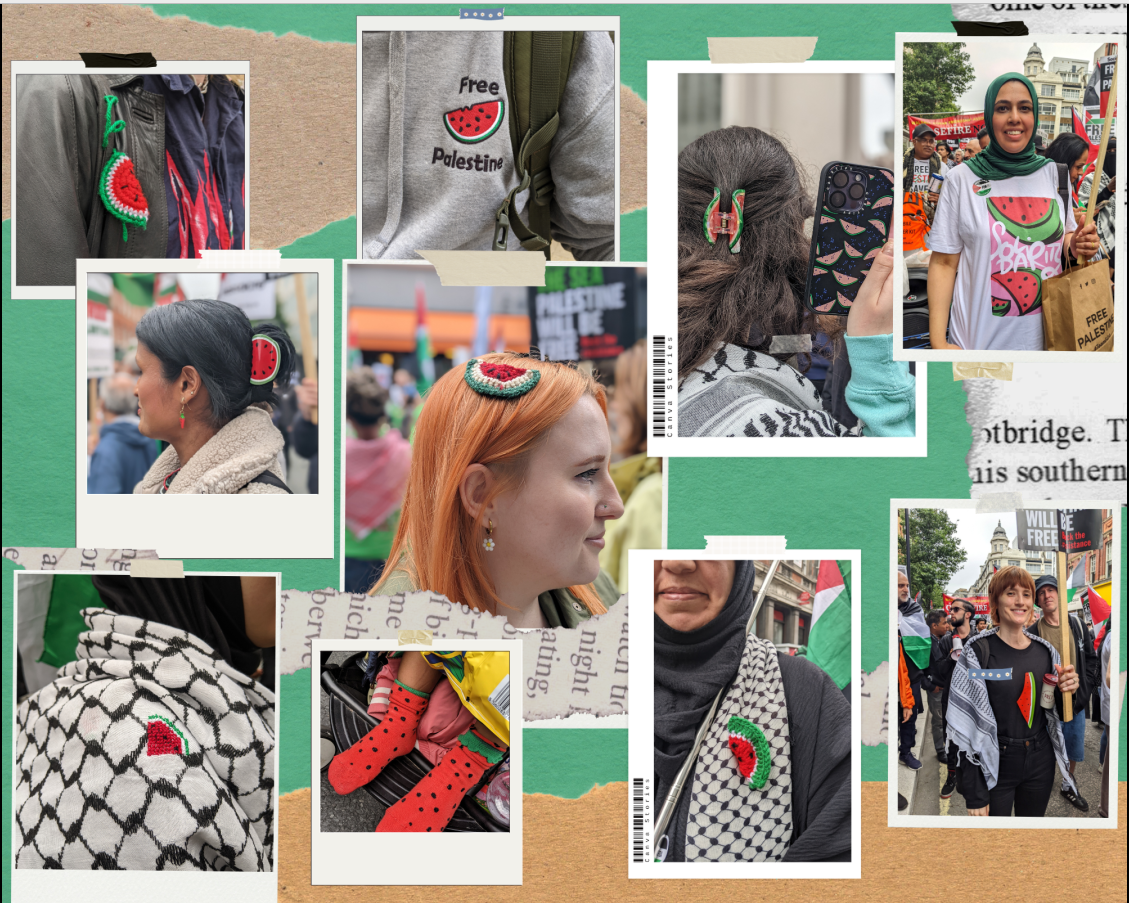
On Saturday, an estimated 250,000 people marched through the streets of London calling for an end to the genocide taking place in Palestine and demanding that the British government stop selling weapons to the Israeli military.
As the death toll in Palestine approaches 35,000 people, the demonstration also marked the 76th anniversary of the Nakba – the 1947/8 ethnic cleansing of 750,000 Palestinians and the denial of their right to return.
In the subsequent decades of occupation, it has at times been illegal for Palestinians to display their flag in Gaza and the West Bank. As a result, in the 1960’s a seemingly innocuous flag substitute was popularised: The Watermelon. Cut open a watermelon and you will see the colours of the Palestinian flag – red, green, white and black. Slices of watermelon were carried on protests which became an arrestable offence.
Having been ‘legalised’ in 1993, the Palestinian flag was once again criminalised in January 2023, leading to the watermelon becoming a symbol of peace and a free Palestine.
The watermelon is now firmly entrenched as a symbol of Palestine in British protest culture. Go on a Free Palestine protest in the UK today and you will see watermelon iconography everywhere – earrings, t-shirts, dresses, bags, crocheted hair-clips, and shoes. The watermelon is part of the vibrant and vital history of people, especially women, using their clothes as a form of non-verbal protest.
Provocative, but safe
As a fruit the watermelon is fun, but there are weighty reasons why so many people have adopted this symbol.
“I want to express my solidarity with the Palestinian struggle for freedom and self determination, but I do not feel safe wearing Palestinian flag symbols, or a black and white keffiyeh in central London today,” says long-term Palestinian rights activist, Nadia Idle. “That was different when I first started working on Palestine issues around 22 years ago. Maybe it was my age, but I also think it was less of a threat to the establishment, unlike this current, growing, global movement.”
Over the years, I have accumulated a small collection of Palestinian scarves and badges but, like Nadia, I have not been wearing them outside of protests because London does not feel safe (and that is as a white woman with enough money for a decent lawyer). I do, however, wear watermelons pretty much everyday – on badges, socks and earrings.
The threat, or perceived threat, comes in part from the fact that Britain has splintered politically and since Brexit, human rights issues like Palestine are used as political footballs in ‘culture wars’ leading to people expressing aggressive and extremist opinions. Then there is the police and the state. The current British government is at war with our right to protest, they want to ban Palestinian flags, and the home secretary says Palestine protests “pollute” the streets – a cry taken up by much of the right wing media. Further afield Palestinian flags were banned at Eurovision, and the crackdown on campus protests in the USA continues to be brutal.
“The UK police are aggressive with protesters because effectively the movement has not stopped protesting the genocide, and the government wants to shut down the movement,” Nadia says. “The government and the police can't arrest you for wearing a watermelon. And if they start to arrest people for wearing watermelons then it becomes very clear what the level of censorship is, because you can't legitimately stop somebody from wearing a fruit.”
Wearing watermelons allows people to publicly express their solidarity while (currently) not adding another layer of visibility or accusations of ‘terrorism’. From my experience of photographing and talking to people on Saturday, the watermelon seems to be particularly embraced by women and non-binary people of all races. Wearing this symbol also offers a sense of commonality in dark times. You can spot other people wearing this “secret code” – much like the historic use of flowers and flower symbols by oppressed LGBTQ* communities.
Working in a UK college where all ‘Palestine symbols’ including watermelons have been banned for staff and students, a friend gets around the ban by innocently carrying an old supermarket bag-for-life that was made in a watermelon print. Outside the UK, however, the potency of the watermelon as a symbol of the defiance of authority has already made watermelon badges high risk for activists in India who want to express solidarity with Palestine, but who face Modi’s right-wing authoritarianism.
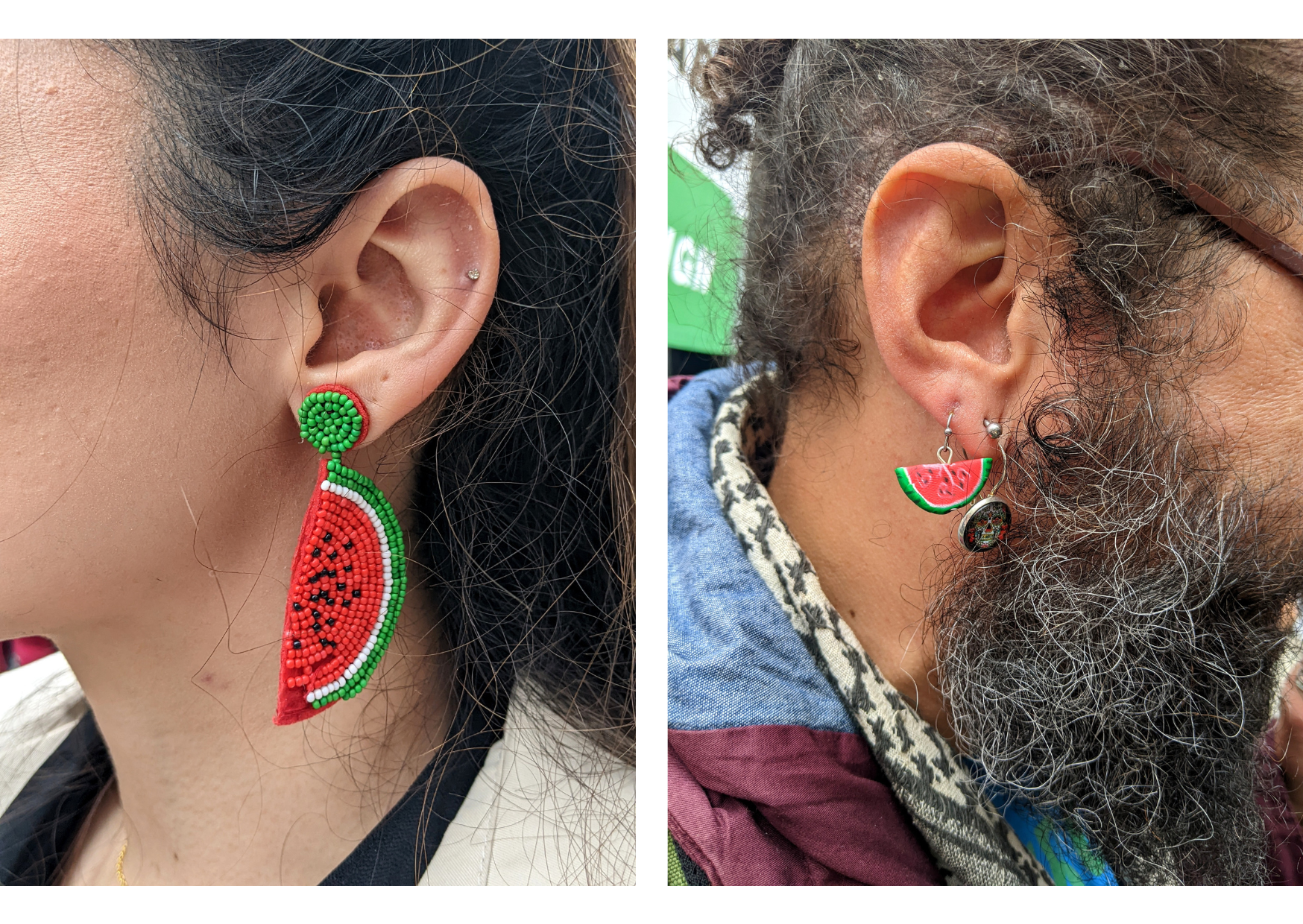
Black Lives Matter
When I asked Nadia why she thought 2024 was the year the watermelon became a defiant emblem, she said it represents a new solidarity movement, one that is up-and-coming and led by young people.
“There is a freshness to it,” Nadia said. “Not only of the symbol but the representation of the symbol. This is the new young movement that has been able to identify the oppression of Palestinians from within a Black Lives Matter and anti-colonial and decolonization framework. They understand, quite rightly, the Palestinians as an indigenous population that are being excluded by, effectively, a Western colonial project.
There is a newness and a freshness which is exemplified by this colourful, joyful fruit that doesn't just represent freshness - it is fresh.”
Watermelon trend?
As I marched on Saturday, I wondered if the fashion industry will co-opt this vibrant red and green surge in watermelons.
In the winter of 2008–9, Israel launched a barbaric offensive against Palestine called Operation Cast Lead. As support for the Palestinians grew in Europe, and London in particular, the black-and-white chequered keffiyeh became fashionable as a symbol of pro-Palestinian and anti-imperialist sentiment. Because the fashion industry is a vampire, the keffiyeh quickly transitioned into a ‘multi-ethnic desert scarf ’ available in every shop and stall on the high street, in a wide range of colours. Balenciaga sold keffiyehs for $2,000 each and pro-Palestinian rapper Lowkey recorded the classic line: ‘I rock a keffiyeh not a Topshop tea towel’.
Sections of the pro-Israeli lobby hoped the mass manufacture of ‘desert scarves’ would take the sting out of the keffiyeh while pro-Palestinian activists worried that the trend would dilute the power of solidarity.
Neither of these things happened. No lasting damage was done and it was easy to tell a keffiyeh from a Topshop tea towel. What did happen, was the sparking of many more conversations about Palestine liberation.
That is the role of the watermelon now – it is carrying a message, not just of radical street style but of creativity under oppression, of global solidarity, of the flame of the human spirit and the capacity to resist and to love across borders in the face of utter horror.
This message, like the keffiyeh and now the watermelon, can not be neutralised, nor stolen, nor stamped out.

My News
- I recently interviewed exiled Burmese trade union leader, Khaing Zar Aung about the situation of life under the military dictatorship and what the workers movement is doing to fight back. The interview was organised and filmed by No Sweat and covers the vital question of what should be done about clothing brands who are still sourcing from Myanmar and benefiting the military dictatorship:
- Last month was hectic to the extent that I haven't publicly told anyone that in April I signed a contract to write a new book. In the current economic climate it feels like a minor miracle to have the opportunity to write my fourth book. It took a while to get what my agent called 'a nibble' of interest, but in the end several publishers made offers. I was wisely reminded to celebrate this moment, so I bought some delicious vegan dinners and revelled in these flowers sent to me by a dear friend. If all goes to plan, Spring 2026 will be the publication date - I've been working on this book for a couple of years and am e.x.c.i.t.e.d!
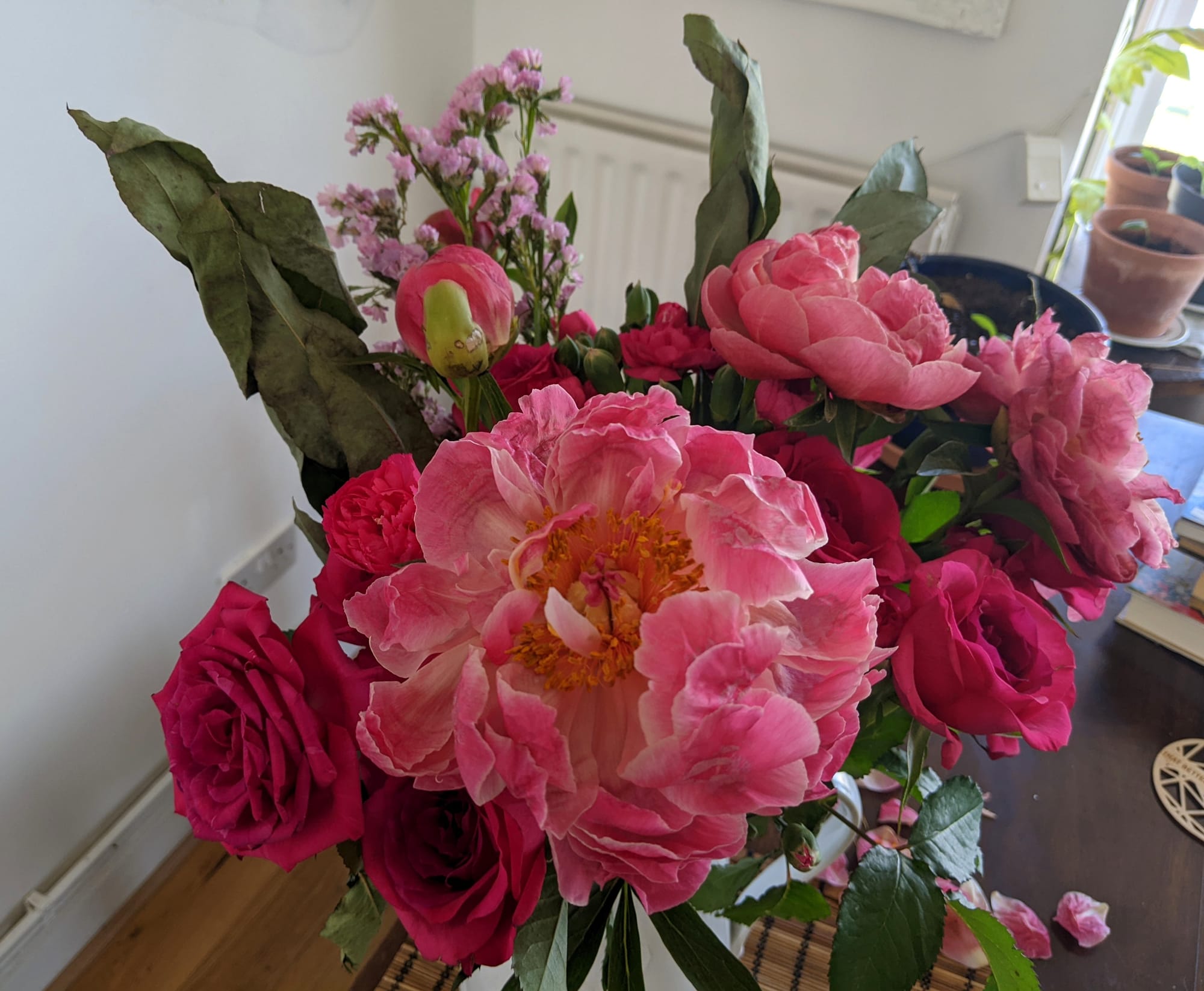
- I also signed the renewed call from 'Fossil Free Books' demanding that Baillie Gifford (an asset manager who sponsors lots of book festivals) divest from the fossil fuel industry and all companies that make a profit from Israeli apartheid, occupation and genocide.
- Jeremy Corbyn formed a Clothing Injustice panel at the monthly Peace and Justice Project seminar. It was great!
Notes From The Profit Margins
A few quick things I am keeping my eye on right now.
- A catwalk in a desert dump - the destructive beauty of 'Atacama Fashion Week'.
- This new trade union and NGO hand book from Cividep in India, which outlines and explains business and human rights standards.
- The news that Dolce & Gabbana are being sued for selling really crap NFT's. This was from the time when luxury clothing brands 'tried to introduce "phygital" into the lexicon by pairing physical items with digital copies that a person might, one day, be able to wear in a metaverse somewhere.' Now D&G are being sued for selling someone $6,000 worth of 'digital wearables' that were 'only "generously" worth $20–$30'.
- Labour Behind the Label want UK citizens to email their MP to support important supply chain legislation (even more important now!)
- Shein is eyeing up the London Stock Exchange and Britain's former chancellor :-/
- Make a cup of tea and read this important new paper from Dr Kanchana N. Ruwanpura on using feminist scholarship to examine the pandemic lives of Sri Lankan garment workers
- And number five - Support Mend It May by mending something - I fixed my bag strap:
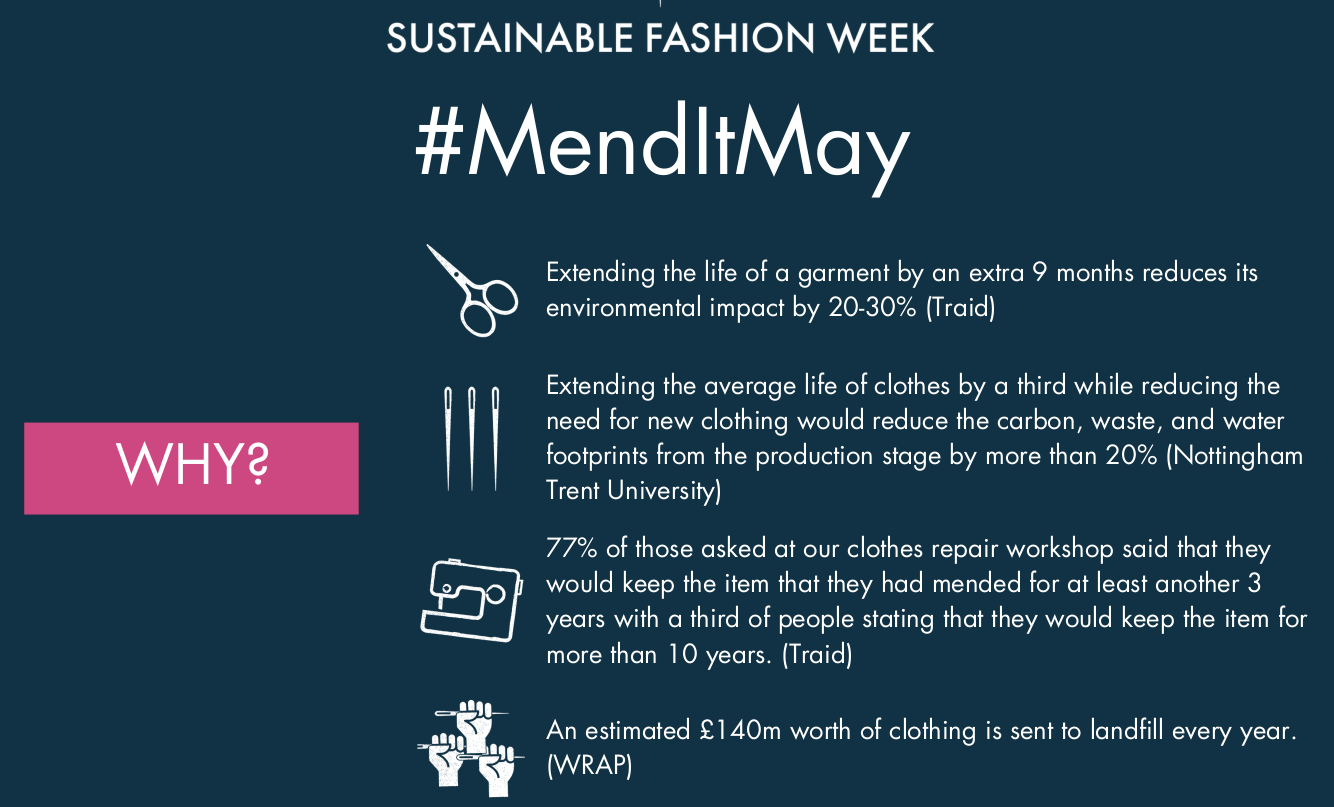
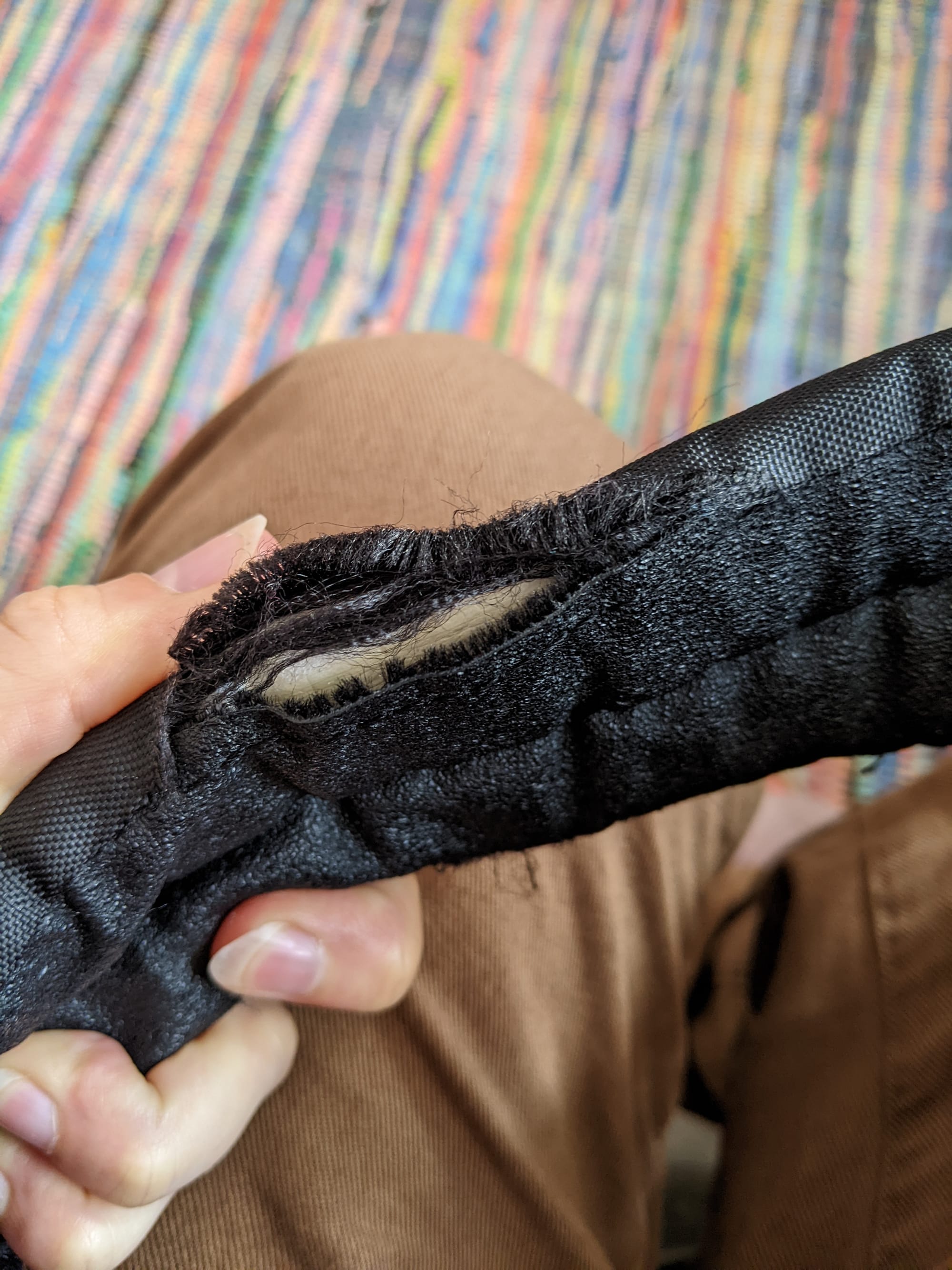
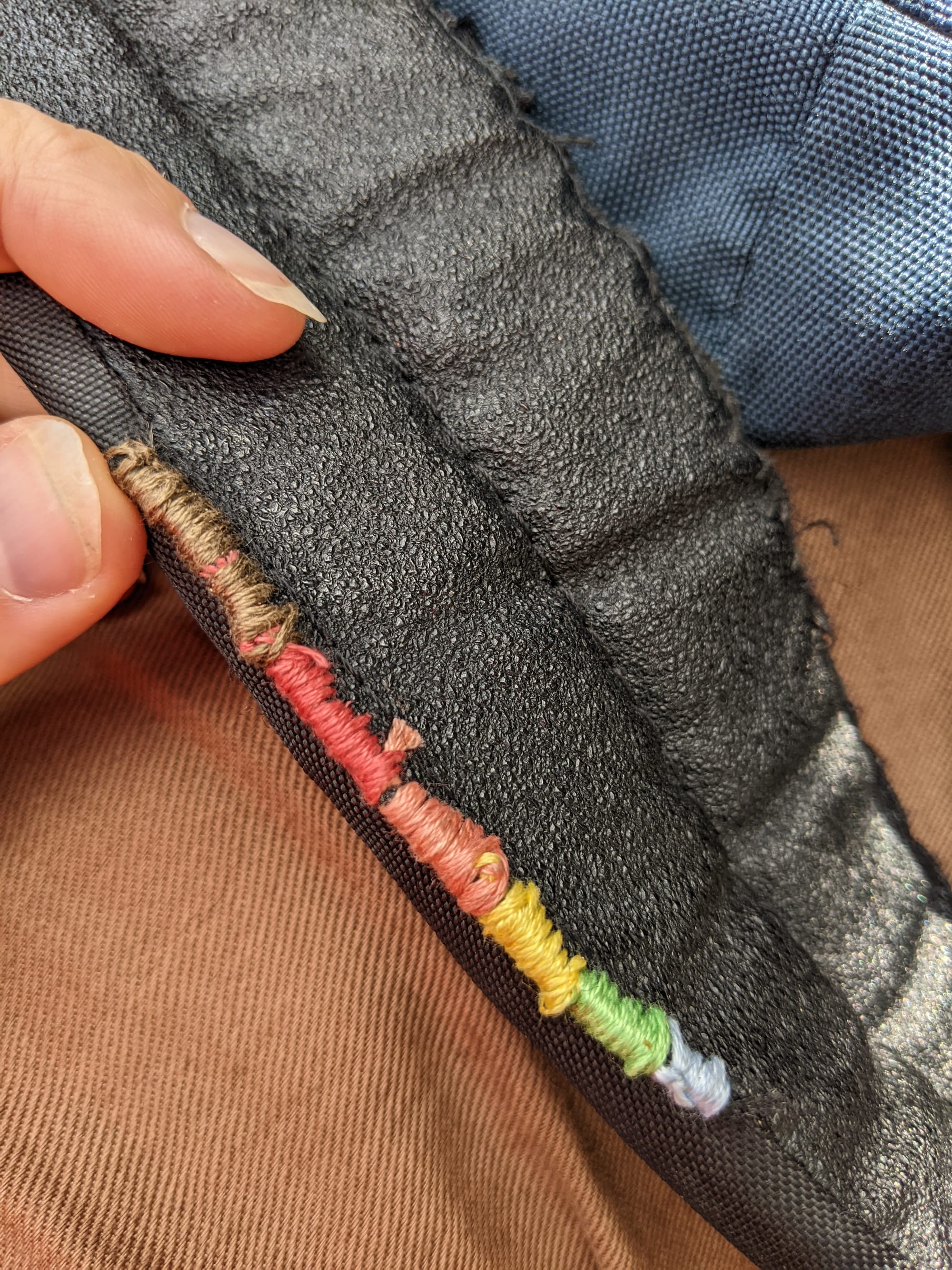
Thank you for reading, this newsletter is free - please forward it to a friend or two.
But... you didn't think I'd sign off without mentioning the UK general election did you? One job between now and 4th July - kick the Tories out. If you need a steer on where to campaign, I am supporting We Deserve Better who back socialist, environmentalist, pro-Palestinian independent and Green candidates. Sign up, pick a campaign, clear your diary and get to work. Let's win this.
In solidarity for the month ahead,
Tansy.
P.s. Based on the lovely messages I get, my Patched advice column seems to be both useful and enjoyed. The last one was from someone looking for ethical yarn ideas, if you have a fashion/clothing question - on theory or practice - drop me a line at DearPatched@proton.me
